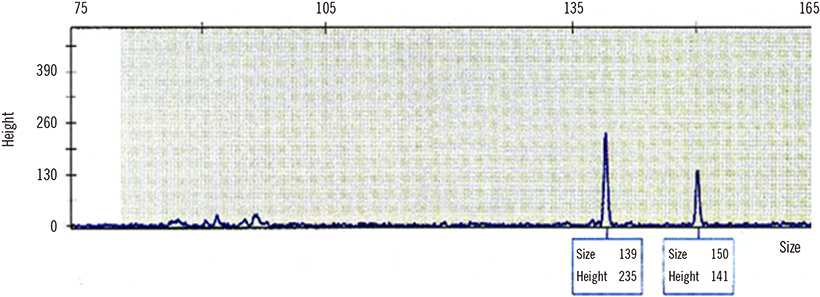Ann Lab Med.
2020 Jan;40(1):80-83. 10.3343/alm.2020.40.1.80.
The First Korean Case of Epstein-Barr Virus-positive Natural Killer/T-cell Lymphoma That Progressed From Severe Mosquito Bite Allergy, With Coexistence of Hemophagocytic Lymphohistiocytosis
- Affiliations
-
- 1Department of Laboratory Medicine, University of Ulsan College of Medicine and Asan Medical Center, Seoul, Korea. cjpark@amc.seoul.kr
- 2Department of Pathology, University of Ulsan College of Medicine and Asan Medical Center, Seoul, Korea.
- 3Department of Pediatrics, University of Ulsan College of Medicine and Asan Medical Center, Seoul, Korea.
- KMID: 2457499
- DOI: http://doi.org/10.3343/alm.2020.40.1.80
Abstract
- No abstract available.
Figure
Reference
-
1. Swerdlow S, Campo E, editors. WHO classification of tumours of haematopoietic and lymphoid tissues. Revised 4th ed. Lyon: International Agency for Research on Cancer;2017. p. 355–363.2. Roh EJ, Chung EH, Chang YP, Myoung NH, Jee YK, Seo M, et al. A case of hypersensitivity to mosquito bite associated with Epstein-Barr viral infection and natural killer cell lymphocytosis. J Korean Med Sci. 2010; 25:321–323.
Article3. Cho JH, Kim HS, Ko YH, Park CS. Epstein-Barr virus infected natural killer cell lymphoma in a patient with hypersensitivity to mosquito bite. J Infect. 2006; 52:e173–e176.
Article4. Asada H, Miyagawa S, Sumikawa Y, Yamaguchi Y, Itami S, Suguri S, et al. CD4+ T-lymphocyte-induced Epstein-Barr virus reactivation in a patient with severe hypersensitivity to mosquito bites and Epstein-Barr virus-infected NK cell lymphocytosis. Arch Dermatol. 2003; 139:1601–1607.
Article5. Asada H. Hypersensitivity to mosquito bites: a unique pathogenic mechanism linking Epstein-Barr virus infection, allergy and oncogenesis. J Dermatol Sci. 2007; 45:153–160.
Article6. Lee WI, Lin JJ, Hsieh MY, Lin SJ, Jaing TH, Chen SH, et al. Immunologic difference between hypersensitivity to mosquito bite and hemophagocytic lymphohistiocytosis associated with Epstein-Barr virus infection. PLoS One. 2013; 8:e76711.
Article7. Tokura Y, Ishihara S, Tagawa S, Seo N, Ohshima K, Takigawa M. Hypersensitivity to mosquito bites as the primary clinical manifestation of a juvenile type of Epstein-Barr virus-associated natural killer cell leukemia/lymphoma. J Am Acad Dermatol. 2001; 45:569–578.
Article8. Gotoh K, Ito Y, Shibata-Watanabe Y, Kawada J, Takahashi Y, Yagasaki H, et al. Clinical and virological characteristics of 15 patients with chronic active Epstein-Barr virus infection treated with hematopoietic stem cell transplantation. Clin Infect Dis. 2008; 46:1525–1534.
Article9. Kimura H, Ito Y, Kawabe S, Gotoh K, Takahashi Y, Kojima S, et al. EBV-associated T/NK-cell lymphoproliferative diseases in nonimmunocompromised hosts: prospective analysis of 108 cases. Blood. 2012; 119:673–686.
Article
- Full Text Links
- Actions
-
Cited
- CITED
-
- Close
- Share
- Similar articles
-
- F‑18 FDG PET/CT in NK/T‑Cell Lymphoma that Progressed from Epstein‑Barr Virus‑Associated Hemophagocytic Lymphohistiocytosis
- A Case of Hypersensitivity to Mosquito Bites without Peripheral Natural Killer Cell Lymphocytosis in a 6-Year-Old Korean Boy
- A Boy with Chronic Active EBV Infection Presented as Mosquito Bite Hypersensitivity Progressed to Fatal Hemophagocytic Lymphohistiocytosis due to NK Cell Neoplasm
- A case of hypersensitivity to mosquito bites with chronic Epstein-Barr virus infection and atypical lymphocytosis
- Case of Chronic Active Epstein-Barr Virus Infection Developed Hemophagocytic Lymphohistiocytosis after COVID-19 Infection



